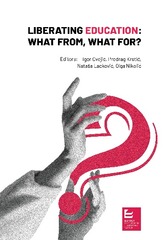Приказ основних података о документу
Liberating Education: What From, What For?
| dc.contributor | Cvejić, Igor | |
| dc.contributor | Krstić, Predrag | |
| dc.contributor | Lacković, Nataša | |
| dc.contributor | Nikolić, Olga | |
| dc.date.accessioned | 2022-02-22T11:27:10Z | |
| dc.date.available | 2022-02-22T11:27:10Z | |
| dc.date.issued | 2021 | |
| dc.identifier.isbn | 978-86-80484-79-2 | |
| dc.identifier.uri | http://rifdt.instifdt.bg.ac.rs/123456789/2509 | |
| dc.description.abstract | Education may lead to emancipation, but it may also be precisely what one should emancipate oneself from. Even though we are the inheritors of the emancipatory potential of the Enlightenment, never before have these been under such rigorous critical scrutiny as from various intellectual traditions of the second half of the 20th century, such as postcolonial and decolonial studies, post-structuralist thought, feminist critique, posthumanism, etc. But precisely because the classic educational emancipatory ideal appears both outdated and still current, there is a great need for rethinking the idea of emancipation, along with the role and the aim of education. | sr |
| dc.language.iso | en | sr |
| dc.publisher | Beograd : Institut za filozofiju i društvenu teoriju | sr |
| dc.relation | info:eu-repo/grantAgreement/MESTD/inst-2020/200025/RS// | sr |
| dc.rights | openAccess | sr |
| dc.rights.uri | https://creativecommons.org/licenses/by-nc-nd/4.0/ | |
| dc.subject | education | sr |
| dc.subject | emancipation | sr |
| dc.subject | social context | sr |
| dc.title | Liberating Education: What From, What For? | sr |
| dc.type | book | sr |
| dc.rights.license | BY-NC-ND | sr |
| dc.citation.spage | 1 | |
| dc.citation.epage | 246 | |
| dc.type.version | publishedVersion | sr |
| dc.identifier.fulltext | http://rifdt.instifdt.bg.ac.rs/bitstream/id/8861/bitstream_8861.pdf | |
| dc.identifier.rcub | https://hdl.handle.net/21.15107/rcub_rifdt_2509 |

